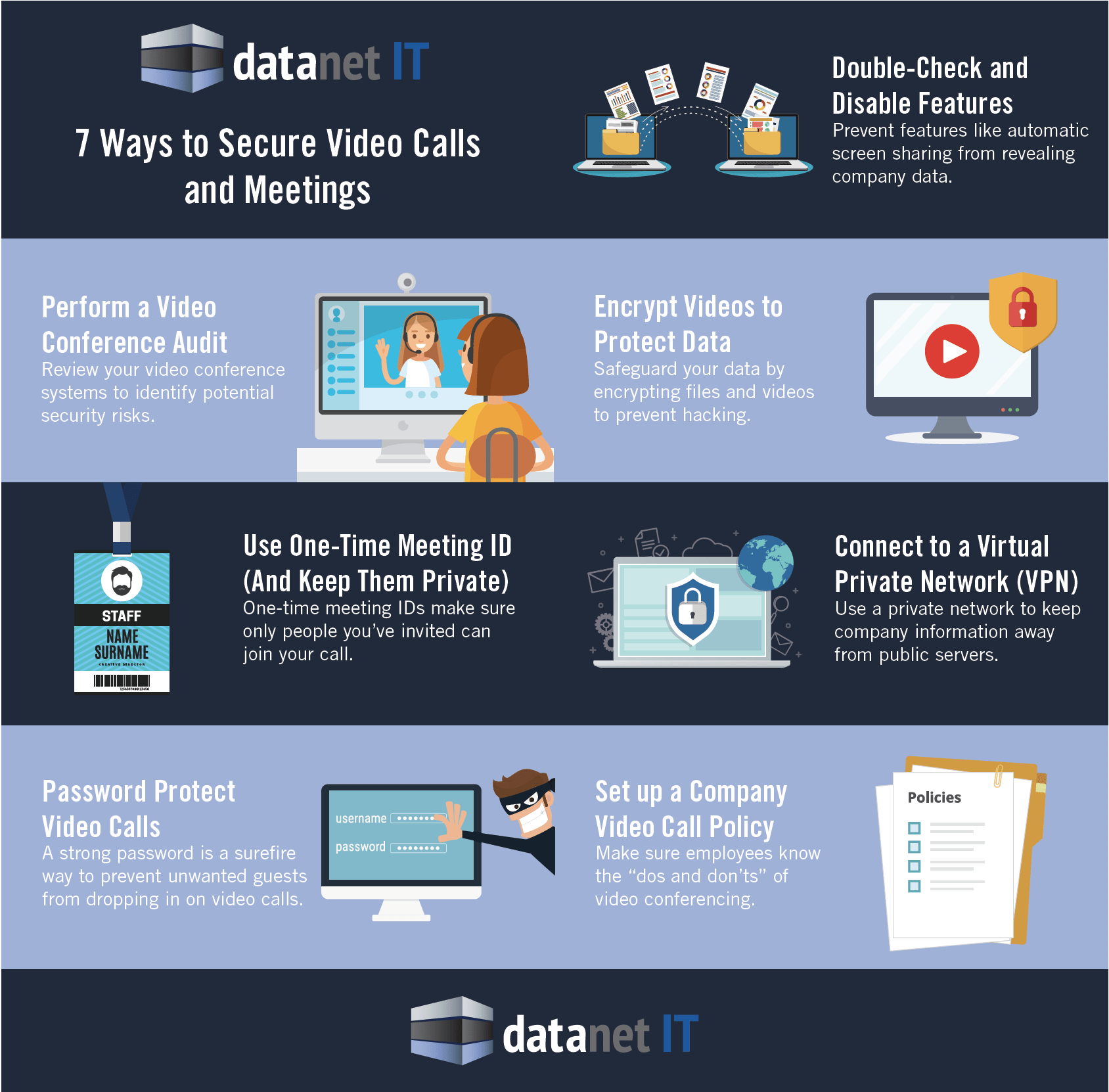- May 05, 2020
- |
- Category:Structured Cabling
The current situation regarding the novel coronavirus (COVID-19) pandemic has upset daily operations for businesses across the globe. As companies adapt to what many are calling the “new normal,” they are quickly realizing that there’s very little normal about our current situation at all. With the onset of social distancing and stay-at-home orders, many employees are learning how to work from home.
For those of us lucky enough to work remotely, technology gives us incredible tools to stay active and productive while practicing social distancing. Many workers are taking full advantage of these tools, with more people working from home than ever before. These advances also bring their share of drawbacks. For businesses, these drawbacks come in the form of hacks and security breaches due to a lack of video conference security.
What can companies do to better protect web conferences and remote workers? Here’s how companies are leaving themselves vulnerable to hackers, and what they can do to better protect themselves, their business, and their data. Find out how your current video conference security (or lack thereof) may not be enough to protect your business and its data.
Your Web Conference is Exposing Your Data
When workers from across the country transitioned to remote work, few businesses had contingency plans in place for such an event. As a result, many employees found themselves quickly hopping on board with the fastest and easiest solution they could find. As with most easy options, there’s almost always a catch. The catch here is that in exchange for convenience, employees are sacrificing the privacy of themselves, and their company.
A report by the Washington Post revealed that Zoom, the popular web conferencing application, exposed thousands of video calls. This breach exposed personal data, video, pictures, and more. Examples of exposed recordings included everything from school classes to therapy sessions and business meetings.
Not only was corporate data exposed to the public, but people have also had their meetings and web conferences intruded upon by uninvited guests. The new trend, called “Zoom-bombing,” involves someone dialing into an unsecured meeting where they’ll shout profanities or other inappropriate comments to disrupt the meeting in progress.
These Zoom-bombers also post hateful or obscene images that can embarrass businesses in front of colleagues or potential clients. The trend has gotten so bad that the FBI sent a warning about “Zoom-bombing.”
Another flaw in the software for Mac users allowed hackers to take control of your microphone and webcam. The company has since said that it is actively working to fix these security issues. Still, there’s more than enough evidence to give business owners pause about using the platform for their next video conference.
7 Ways to Safeguard Video Conference Security
With so much to worry about when it comes to web conferencing and working from home, it’s difficult to know where to start. Also, how do you protect your data while still ensuring employees stay productive?
It’s imperative for businesses to stay productive. It’s also just as important that this productivity does not come at the cost of your privacy. Below are seven steps your company can take to improve video conference security and safeguard your data, your employees, and your customers.
Perform an Audit of Your Video Conference System
The first step to properly protecting your company and its data is to know where you are most vulnerable. The best way to identify potential weaknesses in your web conferencing and remote work tools is to perform a comprehensive audit of your system. By having an expert review your remote work capabilities, you can spot potential problems before they start.
Use One-Time Meeting IDs and Keep Them Private
Each online meeting receives a “Meeting ID.” This meeting ID is what people use to log in to a specific web conference. The issue arises when employees use the same meeting ID for all their upcoming meetings.
Anyone with the meeting ID can join into a call, whether it’s a hacker or an uninvited co-worker. One-time meeting IDs are only used to access their individual meeting, preventing prying eyes from peeking in on other meetings your employees may hold.
Employ Strong Passwords and Multi-Factor Authentication
In our technological age, the importance of a strong password is something everyone should already be familiar with. What people might not consider is using a password for online video conferences. Like a one-time meeting ID, creating a password and only sharing it with those invited can go a long way to preventing unwanted guests from accessing your call.
Check and Disable Features
How much do you really know about that web conference software you’re using? Are you familiar with all the features yet? Like most of us, there’s a good chance you haven’t had the opportunity to fully explore these exciting new tools.
These programs are full of all sorts of useful features that might be helpful for users but bad for businesses. Employees should disable any features that allow someone to record a meeting or share their screen without your permission or otherwise disrupt your event.
Encrypt Videos to Protect Data
Even with all these steps in place, your company data may still be at risk. Businesses must ensure data is properly encrypted if they want to protect information from hackers. You should secure your web conferences through TLS (Transport Layer Security) encryption to better protect messages, files, and other sensitive information.
It’s also important to practice encryption at rest for sensitive data you may not be actively using. Examples of data at rest may include recordings of meetings themselves, notes, and transcripts. To better protect your data, your IT provider should use 256-bit AES encryption to make sure your data is up to date with industry standards.
Use a Virtual Private Network (VPN)
If your company isn’t already using a virtual private network to secure its communications, it’s definitely time to start. A VPN is a private network that functions in addition to your existing public network.
Employees working on a VPN can send, receive, and collaborate over the network as though each person’s device was connected to a private network. Through a VPN, businesses can encrypt data and share company information with confidence, knowing that everything is on a private server.
Set up a Company Web Conference Policy
There’s a good chance your company already has an internet policy in place for employees. It may include rules such as not viewing inappropriate content on a work machine or downloading and installing unfamiliar programs not approved by your IT team.
However, there’s also a high probability that you weren’t thinking about remote workers when you wrote your web policy. Take the time to outline the rules as well as the dos and don’ts of online conferences for employees. When employees are aware of potential issues, they’ll be much more mindful when it comes to avoiding them.
Don’t Let Remote Work Ruin Your Business. Call Today!
Even after things go back to normal, remote work is here to stay. This means video conferences are only going to become a more regular feature of business life, and we’re all going to have to learn to deal with it. This is why it is so important for businesses to invest in the right meeting collaboration tools.
When you trust the certified IT experts at datanet IT, you’re partnering with industry leaders with more than three decades of experience. Find the right video conferencing security solution for your business today and ensure your company is ready for tomorrow.



